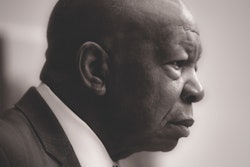Color Us United, a nonprofit that advocates for a “race-blind” America, declared a “historic victory” over DEI efforts at the University of North Carolina’s School of Medicine (UNC). In a press conference Thursday, the organization took credit for the university’s February decision that it would not require DEI statements from job and tenure candidates, as well as the school’s recent confirmation that a task force to integrate social justice into curricula had been disbanded and its recommendations not taken. However, a closer look reveals a more complicated picture: DEI may be far from dead at UNC.
 Kenny Xu, president of Color Us United
Kenny Xu, president of Color Us United
It's clear that UNC will not request DEI statements from job candidates, although it’s not clear how much Color Us United played a role in that decision. DEI statements have sparked considerable controversy across the entire country, and several states have looked to ban them.
Where things get murkier is the dissolution of the social justice task force without its recommendations, which included training admissions staff about selection bias, examining sources and ensuring that they include materials from people of marginalized backgrounds, and giving students the opportunity to provide feedback about their personal experiences with DEI in the curriculum, being taken up.
Color Us United cites a May 11th letter to the Foundation for Individual Rights and Expression (FIRE) from UNC Senior University Counsel Kirsten C. Stevenson as proof that it has triumphed over DEI at UNC. The letter seems unambiguous on its surface.
“There is no plan to implement the Task Force’s recommendations now or in the future,” the letter said. “Even if the recommendations were revisited in the future, further review and revision would be required.”
But these DEI efforts may still be taking place at UNC. The task force that had been disbanded is just one of two with very similar missions at UNC, one affiliated with the School of Medicine itself and one affiliated specifically with the Department of Health Sciences. Although the task forces had different members, their timelines of operation overlap, and many of their DEI recommendations are similar.
The May 11th letter refers only to the task force linked to the Department of Health Sciences. It does not address whether the DEI recommendations from the other task force—many of which are the same—have been implemented. And it looks like they may have been: in a February 2022 response to the School of Medicine task force’s recommendations, the university said that 37 of 42 recommendations were being addressed by the school’s existing efforts.
The UNC School of Medicine did not respond to multiple requests for comment. When asked about the two task forces at the press conference, Xu appeared to conflate them.
 Dr. Harrison M. Rosenthal, a litigation fellow at the Foundation for Individual Rights and Expression
Dr. Harrison M. Rosenthal, a litigation fellow at the Foundation for Individual Rights and Expression
“The only position that we got confirmation on was the narrow aspect of the task force that conditioned tenure, promotion, and advancement on subscribing to certain ideological tenants, in this case DEI,” he said. “It’s possible that work in other aspects of DEI is being continued.”
Color Us United said that it would monitor the situation at UNC by emailing employees and asking them to report any unconscious bias trainings, racial preferences, curricula based in critical race theory, and divisive political statements. It unveiled an “alternative framework” that it called on UNC to adopt, based around the acronym MEDS (merit, equality of opportunity, diversity of thought, and straight talk).
Xu also announced plans to target other elite medical schools that incorporate DEI principles, including Harvard University, Johns Hopkins University, and the Perelman School of Medicine at the University of Pennsylvania.
“We can say, ‘UNC has stopped their DEI framework because they know how divisive and anti-meritocratic it is.’ What are you going to do?” said Xu.
Although it remains unclear exactly what UNC has done and the extent to which their DEI efforts continue, it seems as though Color Us United’s claims of a full reversal may remain more of an aspiration than a reality—at least for the moment.
Jon Edelman can be reached at [email protected]















